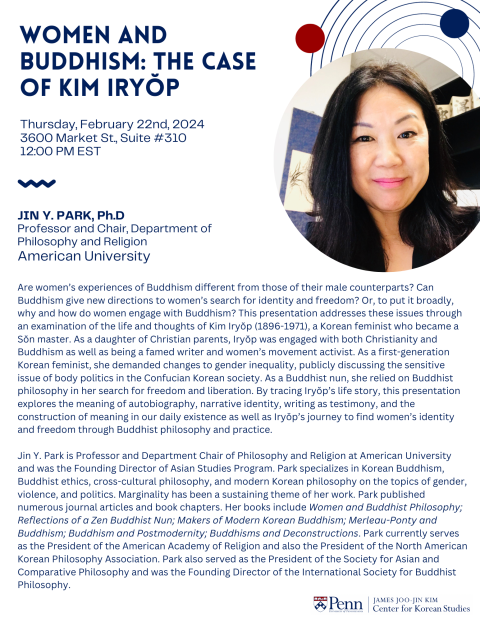
Korean Studies Colloquium
3600 Market Street, Suite 310 Philadelphia, PA 19104
Optional Zoom registration HERE
Are women’s experiences of Buddhism different from those of their male counterparts? Can Buddhism give new directions to women’s search for identity and freedom? Or, to put it broadly, why and how do women engage with Buddhism? This presentation addresses these issues through an examination of the life and thoughts of Kim Iryŏp (1896-1971), a Korean feminist who became a Sŏn master. As a daughter of Christian parents, Iryŏp was engaged with both Christianity and Buddhism as well as being a famed writer and women’s movement activist. As a first-generation Korean feminist, she demanded changes to gender inequality, publicly discussing the sensitive issue of body politics in the Confucian Korean society. As a Buddhist nun, she relied on Buddhist philosophy in her search for freedom and liberation. By tracing Iryŏp’s life story, this presentation explores the meaning of autobiography, narrative identity, writing as testimony, and the construction of meaning in our daily existence as well as Iryŏp’s journey to find women’s identity and freedom through Buddhist philosophy and practice.
Jin Y. Park is Professor and Department Chair of Philosophy and Religion at American University and was the Founding Director of Asian Studies Program. Park specializes in Korean Buddhism, Buddhist ethics, cross-cultural philosophy, and modern Korean philosophy on the topics of gender, violence, and politics. Marginality has been a sustaining theme of her work. Park published numerous journal articles and book chapters. Her books include Women and Buddhist Philosophy; Reflections of a Zen Buddhist Nun; Makers of Modern Korean Buddhism; Merleau-Ponty and Buddhism; Buddhism and Postmodernity; Buddhisms and Deconstructions. Park currently serves as the President of the American Academy of Religion and also the President of the North American Korean Philosophy Association. Park also served as the President of the Society for Asian and Comparative Philosophy and was the Founding Director of the International Society for Buddhist Philosophy.
 James Joo-Jin Kim Center for Korean Studies
James Joo-Jin Kim Center for Korean Studies